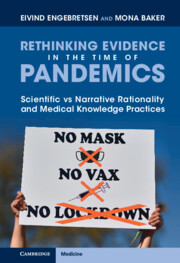
-
Select format
-
- Publisher:
- Cambridge University Press
- Publication date:
- September 2022
- September 2022
- ISBN:
- 9781009030687
- 9781316516607
- Creative Commons:
-
This content is Open Access and distributed under the terms of the Creative Commons Attribution licence CC-BY-NC-ND 4.0.
https://creativecommons.org/creativelicenses - Dimensions:
- (234 x 156 mm)
- Weight & Pages:
- 0.34kg, 116 Pages
- Dimensions:
- Weight & Pages:
Open AccessYou have access to this book
Book description
The COVID-19 crisis has transformed the highly specialized issue of what constitutes reliable medical evidence into a topic of public concern and debate. This book interrogates the assumption that evidence means the same thing to different constituencies and in different contexts. Rather than treating various practices of knowledge as rational or irrational in purely scientific terms, it explains the controversies surrounding COVID-19 by drawing on a theoretical framework that recognizes different types of rationality, and hence plural conceptualizations of evidence. Debates within and beyond the medical establishment on the efficacy of measures such as mandatory face masks are examined in detail, as are various degrees of hesitancy towards vaccines. The authors demonstrate that it is ultimately through narratives that knowledge about medical and other phenomena is communicated to others, enters the public space, and provokes discussion and disagreements. This title is also available as Open Access on Cambridge Core.
Reviews
‘Deploying a nuanced analytical framework to tackle the social complexity of evidentiary truth, Engebretsen and Baker bring sociological order and meaning to the apparent incoherencies of collective and individual action in times of crisis. An exemplary illustration of how social science can confidently illuminate the social dimensions of truth-making without undermining its own epistemic coherence.’
Inanna Hamati-Ataya - University of Cambridge
‘In this readable, incisive analysis of recent history, Engebretsen and Baker critically revisit, expand and update Fisher’s narrative paradigm for the 21st century. Evident throughout is the urgent relevance of stories not only for how we make sense of the world but for how we must imaginatively configure new and hopeful stories for effective, transformative politics.’
Sue-Ann Harding - Queen’s University Belfast
Contents
Full book PDF-
Rethinking Evidence in the Time of Pandemics
pp i-ii -
-
- You have access
- Open access
- HTML
- Export citation
-
-
Copyright page
pp iv-iv -
-
- You have access
- Open access
- HTML
- Export citation
-
-
Contents
pp v-vi -
-
- You have access
- Open access
- HTML
- Export citation
-
-
Tables and Figures
pp vii-vii -
-
- You have access
- Open access
- HTML
- Export citation
-
-
Acknowledgements
pp viii-viii -
-
- You have access
- Open access
- HTML
- Export citation
-
-
Chapter 1 - Evidence in Times of Crisis
pp 1-7 -
-
- You have access
- Open access
- HTML
- Export citation
-
-
Chapter 2 - Narrative Rationality and the Logic of Good Reasons
pp 8-27 -
-
- You have access
- Open access
- HTML
- Export citation
-
-
Chapter 3 - Whose Evidence? What Rationality? The Face Mask Controversy
pp 28-44 -
-
- You have access
- Open access
- HTML
- Export citation
-
-
Chapter 4 - Whose Lives? What Values? Herd Immunity, Lockdowns and Social/Physical Distancing
pp 45-60 -
-
- You have access
- Open access
- HTML
- Export citation
-
-
References
pp 92-102 -
-
- You have access
- Open access
- HTML
- Export citation
-
-
Index
pp 103-108 -
-
- You have access
- Open access
- HTML
- Export citation
-
Metrics
Altmetric attention score
Full text views
Full text views help Loading metrics...
Loading metrics...
* Views captured on Cambridge Core between #date#. This data will be updated every 24 hours.
Usage data cannot currently be displayed.
Accessibility standard: Unknown
Why this information is here
This section outlines the accessibility features of this content - including support for screen readers, full keyboard navigation and high-contrast display options. This may not be relevant for you.
Accessibility Information
Accessibility compliance for the PDF of this book is currently unknown and may be updated in the future.


